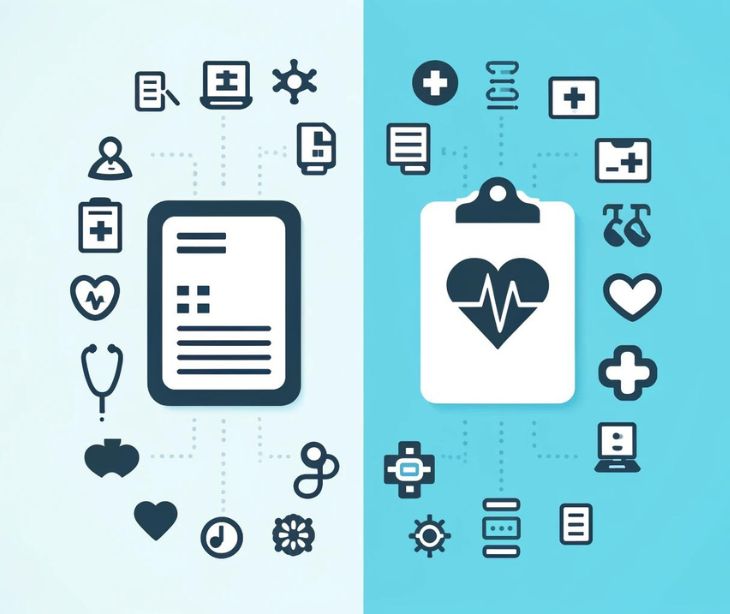
Medication errors within electronic health records (EHR) systems can stem from design flaws, user interface issues, data entry errors, and communication challenges.
What are medication errors?
Medication errors in an electronic health record (EHR) system can happen while prescribing, dispensing, or administering medications. These errors may result from various factors, including system design, user input, or communication breakdowns.
Types of medication errors
Data entry errors
Incorrect medication selection: Choosing the wrong medication from the dropdown menu or entering an incorrect drug name can lead to prescribing the wrong medication.
Dosage errors: Typing errors or selecting the wrong dosage can result in patients receiving incorrect medication.
Alert overrides
Ignored alerts: EHR systems often generate alerts for potential drug interactions, allergies, or other safety concerns. Providers may override or ignore these alerts, leading to medication errors if critical information is dismissed.Incomplete medication history
Missing or outdated information: Incomplete or outdated medication histories can contribute to errors in prescribing, as healthcare providers may not have a comprehensive view of a patient's current medications.Copy-paste mistakes
Reused information: Copying and pasting information from one patient's record to another can result in outdated or incorrect medication information being carried over.User interface challenges
Confusing layouts: Poorly designed interfaces may lead to confusion, making it easier for healthcare providers to select the wrong medication or dosage.
Unclear abbreviations: Vague abbreviations in the EHR interface can contribute to medication errors.
Interoperability issues
Lack of integration: Inadequate communication and data sharing among healthcare providers can lead to incomplete medication records, increasing the risk of errors.
System downtime
Data unavailability: Technical issues or system downtime can prevent access to medication information, potentially leading to prescribing errors.
Patient mix-ups
Incorrect patient selection: Selecting the wrong patient's record may result in prescribing medication intended for one patient to another.
Impact of medication errors
Medication errors can seriously affect patients, healthcare providers, and healthcare systems. The impacts of these errors can range from mild to severe, and they may affect various aspects of patient care:
- Adverse drug events (ADEs): Medication errors can lead to ADEs, causing harm to patients. These events may include allergic reactions, side effects, or toxicity due to incorrect dosages or drug interactions.
- Worsening of health conditions: Medication errors can worsen existing health conditions or delay patients' improvement, leading to prolonged illness or complications.
- Additional treatments: Adverse effects resulting from medication errors may lead to additional medical treatments, diagnostic tests, or hospitalizations, increasing healthcare costs.
- Malpractice claims: Severe medication errors can lead to malpractice claims against healthcare providers or institutions, resulting in legal and financial repercussions.
- Investigations and penalties: Serious medication errors may trigger regulatory investigations, potentially resulting in penalties or sanctions against healthcare providers or institutions.
- Workflow disruptions: Addressing and rectifying medication errors can disrupt normal healthcare workflows, affecting the efficiency and effectiveness of care delivery.
How to avoid medication errors
- Use EHRs effectively: Ensure the proper implementation and use of EHR systems with user-friendly interfaces and functionalities.
- Standardize medication processes: Establish standardized medication prescribing, dispensing, and administration processes.
- Use decision-support tools: Leverage EHR decision-support tools, such as alerts for potential drug interactions or allergies, to assist healthcare providers in making informed and safe medication decisions.
- Double-check prescriptions: Encourage healthcare providers to double-check medication orders for accuracy before they are finalized. This includes verifying the drug name, dosage, route of administration, and frequency.
- Adopt barcoding technology: Implement barcode scanning systems for medication administration to ensure the right patient receives the proper medication at the correct dose and time.
See also: HIPAA Compliant Email: The Definitive Guide
FAQs
What are the medical errors caused by the EHR?
EHRs can cause problems with information display, difficult data entry, and failure to alert users of potential risks.
What is the medication management system in an EHR?
The EHR provides details about the medication order, including the dosage, route, frequency, and additional information from the provider who created the order.
How do prescription mistakes contribute to medication errors?
Errors made in the prescription can introduce medication errors via illegible handwriting, abbreviation confusion, and dosage errors.
Subscribe to Paubox Weekly
Every Friday we'll bring you the most important news from Paubox. Our aim is to make you smarter, faster.



